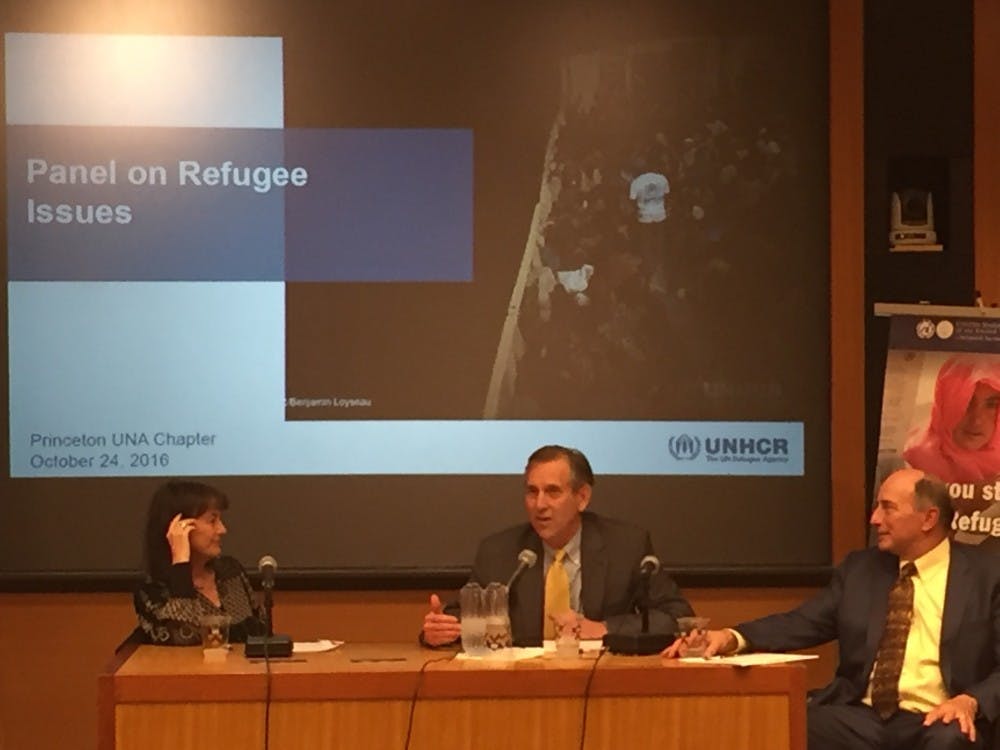The Wilson School hosted a panel on Monday about refugees, with topics of discussion ranging from the conditions that haunt refugees as they relocate between nations, to how organizations can help them return home, to adjusting to life in a new country. Panelists also discussed their experiences in working with refugees and refugee issues in their professional work.
The discussion began with Jeffrey Laurenti GS ’74, who moderated the panel. Laurenti is the former executive director of policy studies for the United Nations Association of the United States of America.
“Over these 71 years, a web of international, legal obligations, treaty laws, and international agencies have been constructed to create some sort of obligation on behalf of the international community to respond to the plight of refugees, and even bringing attention to the issue of migration more broadly," Laurenti said about the significance of the lecture falling on United Nations Day, Oct. 24.
Laurenti said that the definition of a refugee must expand from the traditional, though scarring, images in the media. For example, he noted that the vast majority of the 65 million refugees in the world are not from Syria and do not receive the humanitarian aid that a Syrian refugee may get.
Ninette Kelley, director of the United Nations High Commissioner for Refugees office in New York City, began her presentation with statistics about the current refugee crisis. She explained that in 2010, the global population of refugees was 10 million and the population had grown to 15.1 million by 2015, a 50 percent increase due largely to the Syrian refugee crisis. Without this crisis, Kelley said, the normal increase within those five years would have been only seven percent.
Kelley also discussed the role of climate change and natural disasters in displacing populations. She noted the lack of monetary funds that are allocated to humanitarian assistance, where only 39 percent of this assistance is funded while other fields, such as military spending, receive an abundance of monetary allocations.
When discussing resettlement, Kelley said that in 2005, one million displaced people would return home but that number has now dwindled down to about 200,000. In the case of families not returning home, for example, she explained that parents struggle to accept the grim environment that refugee life means for their children, such as substandard and limited means for education, public services, and other livelihood opportunities.
“We had parents, when faced with living in a very dismal and desperate situation, [who] will do what they can in order to give their children a better life,” she said, adding that many parents would rather die than fail to find a suitable lifestyle for their family.
Frederick Barton, a lecturer in the Wilson School and formerassistant secretary of state for conflict and stabilization operations at the State Department, asked the audience to raise their hand if they identified as refugees or were the descendants of refugees. While no one in the audience identified as a refugee, several people raised their hands to identify themselves as the child or grandchild of a refugee. To this, Barton explained that one seventh of the global population identifies as migrants, making facilitating refugees resettlement and addressing their issues a relevant need.
Barton noted that although countries like the U.S., Canada, Australia, and New Zealand have historically taken in masses of refugees, there are still a multitude of challenges that need to be addressed. The first is in reference to the global commitment the world has made to refugees in providing protection and durable solutions; Barton noted that the latter action has been more difficult to provide in the dual push to address the resettlement issue.
The second challenge, according to Barton, is the denial of the realities surrounding refugees and that these issues are often categorized as something else. He used Latin American tensions as an example, where conflicts should be categorized as wars and a country’s migrants should be categorized as refugees. The third challenge is in properly addressing the flood of refugees that may overwhelm a local population’s capacity. When a locality is not equipped to handle the sudden spike in population, Barton noted that the solution thus far has been to place refugees in camps.
“When we encamp them,” he said, “we are generally not doing our best by them. Refugees would rather not be in camps, it’s an outdated model. It’s an irony of our system that the people who are most responsible for protecting the refugees, like the UNHCR, also happen to run the most camps in the world.”
Laurenti asked the panelists about the role of the media in portraying the current refugee crisis. Both panelists answered that the media is a powerful voice in influencing public opinion.
Barton added that while there is a deep commitment to honest portrayal of the refugee crisis and aiding refugees, he said that the reality is inadequate. Humanizing the refugee experience, he explained, would be a method of understanding the crises of displaced persons.
The panel concluded with a question-and-answer period, and questions ranged from the effect of Islamophobia on the image of refugees, to access for women’s health, to the educational structures — and lack thereof — that may be serving refugee children.
The talk, titled, “Up to the Minute Panel: The Global Refugee Crisis,” was free and open to the public and took place in Robertson Hall, Bowl 016.







